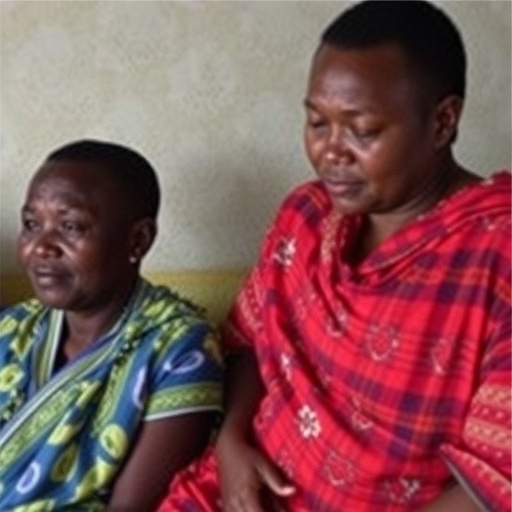
Metabolic syndrome has emerged as a significant concern among individuals living with HIV, particularly those undergoing first-line antiretroviral therapy (ART) in resource-challenged environments. In this context, a study conducted in Tanzania has shed light on the prevalence and implications of this syndrome, providing essential insights into the intersection of HIV management and metabolic health. As antiretroviral therapies continue to evolve, understanding their effects on metabolic parameters becomes increasingly vital.
The study by Bintabara, Hyera, and Shayo highlights critical data gathered from a facility-based survey in Tanzania, where ART is a cornerstone of HIV management. The researchers aimed to identify the prevalence of metabolic syndrome in individuals receiving HIV treatment, seeking to understand how these therapies might contribute to the development of conditions associated with metabolic dysfunction. Given the rising number of people living with HIV who have greater access to anti-HIV medication, acknowledging the potential side effects of ART on metabolic health is imperative.
The researchers collected data from a diverse cohort of patients, considering various demographic factors, ART regimens, and existing comorbidities. This comprehensive approach allowed for a nuanced understanding of metabolic syndrome prevalence, revealing alarming trends that could significantly impact patient health outcomes. Metabolic syndrome, characterized by obesity, hypertension, dyslipidemia, and insulin resistance, poses severe risks, including cardiovascular disease and diabetes, particularly troubling for individuals already battling HIV.
Within the Tanzanian context, healthcare systems often face challenges with limited resources and access to advanced monitoring technologies. This study illustrates the need for healthcare practitioners to incorporate regular metabolic screenings into routine HIV management protocols—something that has historically been overlooked in settings with constrained healthcare infrastructures. The study further emphasizes that recognizing and addressing metabolic syndrome in HIV patients is crucial for holistic treatment approaches.
Another critical finding of this survey is the influence of socio-economic factors on the prevalence of metabolic syndrome. Participants with lower income levels and limited access to nutrition education exhibited a higher tendency toward developing metabolic abnormalities. The study highlights the importance of contextualizing healthcare recommendations within socio-economic realities, advocating for personalized care models that consider individual patient circumstances.
The implications of metabolic syndrome in HIV-positive populations are profound, underscoring the dual burden of battling both viral infections and chronic non-communicable diseases. As ART regimens are associated with long-term use, it becomes essential to evaluate their impact beyond viral suppression. The study’s findings compel researchers and clinicians to prioritize research into alternative therapies and adjunct strategies that might mitigate these adverse metabolic outcomes.
Furthermore, understanding the biochemical pathways linking HIV and metabolic dysfunction is critical. The interplay between chronic inflammation from viral activity and the effects of ART on metabolic pathways remains a rich area for exploration. Interventions aimed at reducing inflammation and enhancing metabolic health must be developed to offer better quality of life and longevity for this vulnerable population.
Empowering patients with knowledge about lifestyle modifications is another vital component of addressing metabolic syndrome. The study advocates for the integration of nutrition counseling and physical activity interventions into routine HIV care. By promoting healthier lifestyle choices, healthcare providers can help mitigate the risks associated with metabolic syndrome, thereby potentially reducing comorbidities in HIV-positive individuals.
While this research underscores concerning trends, it also opens doors for future studies. There is a pressing need for longitudinal studies that track the metabolic health of HIV patients over time. Such research could illuminate the long-term effects of ART on metabolic syndrome and identify critical time points for intervention. It is through this lens that healthcare professionals can better tailor treatments that support the holistic health of individuals living with HIV.
In summary, the findings of Bintabara, Hyera, and Shayo serve as a clarion call for the global healthcare community. As the landscape of HIV treatment shifts towards longevity and overall health outcomes, addressing metabolic syndrome must become a priority. Healthcare systems in resource-scarce settings must implement strategies that bridge the gap between viral suppression and the management of chronic, non-communicable diseases.
In conclusion, as we strive toward optimizing HIV treatment regimens, it is essential to remain vigilant about the potential complications posed by metabolic syndromes. This area of research not only contributes to our understanding of HIV patient care but also underscores the need for a comprehensive approach to healthcare that transcends infectious disease management.
Subject of Research: Prevalence of metabolic syndrome among people living with HIV on first-line antiretroviral therapy in Tanzania.
Article Title: Metabolic syndrome among people living with HIV on first-line antiretroviral therapy in scarce-resource settings: an evidence from Tanzanian facility-based survey.
Article References: Bintabara, D., Hyera, S.T. & Shayo, F.K. Metabolic syndrome among people living with HIV on first-line antiretroviral therapy in scarce-resource settings: an evidence from Tanzanian facility-based survey.
BMC Endocr Disord 25, 196 (2025). https://doi.org/10.1186/s12902-025-01968-3
Image Credits: AI Generated
DOI:
Keywords: HIV, metabolic syndrome, antiretroviral therapy, Tanzania, chronic disease, healthcare, nutrition education, lifestyle interventions.
Tags: comorbidities in HIV treatmentdyslipidemia among ART patientsevolving antiretroviral therapiesfacility-based survey of HIV patientsHIV patients on antiretroviral therapyimpact of ART on metabolic healthimplications of metabolic dysfunction in HIVmetabolic syndrome prevalence in Tanzaniaobesity and hypertension in HIVpatient health outcomes in HIV managementresource-challenged environments and HIVunderstanding metabolic parameters in HIV care





